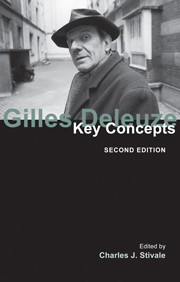Book contents
- Frontmatter
- Contents
- Contributors
- Acknowledgements
- Abbreviations
- Introduction: Gilles Deleuze, a life in friendship
- PART I PHILOSOPHIES
- PART II ENCOUNTERS
- 5 Sense, series
- 6 Event
- 7 Assemblage
- 8 Micropolitics
- 9 Becoming-woman
- 10 The minor
- 11 Style, stutter
- 12 The logic of sensation
- 13 Cinema
- Part III FOLDS
- Chronology
- Bibliography
- Index
5 - Sense, series
from PART II - ENCOUNTERS
- Frontmatter
- Contents
- Contributors
- Acknowledgements
- Abbreviations
- Introduction: Gilles Deleuze, a life in friendship
- PART I PHILOSOPHIES
- PART II ENCOUNTERS
- 5 Sense, series
- 6 Event
- 7 Assemblage
- 8 Micropolitics
- 9 Becoming-woman
- 10 The minor
- 11 Style, stutter
- 12 The logic of sensation
- 13 Cinema
- Part III FOLDS
- Chronology
- Bibliography
- Index
Summary
At the end of the 1960s, Gilles Deleuze found himself in at once troubled and exhilarating circumstances. The trouble came from an illness to which he had fallen victim, tuberculosis, the effects of which he would suffer for the rest of his life. However, at the same time, in 1968–69, he had completed the work required within the French university system at the time to defend his dissertation, consisting of a “secondary thesis”, his 1968 book on Spinoza translated as Expressionism in Philosophy: Spinoza, and his “principal thesis”, also published in 1968, Difference and Repetition. At the same time, however, Deleuze was developing yet another study, The Logic of Sense (1969), related to these contemporary texts in its continued examination of the concepts of expression, affect, difference and repetition. Yet, this study moved beyond these important works through Deleuze's careful probing and gradual extension of the key term in the title, sense, and through his articulation of an alternative logic by which this key term might be understood, through a play of series. In this essay, we explore this conceptual extension and articulation.
We can begin to approach Deleuze's concept of sense by contrasting it with the “common sense” and “good sense” of the philosophical tradition. For Deleuze, common sense and good sense are complementary aspects of the fundamental doxa of representation. That is, they constitute two essential yet unexamined presuppositions of Western thought.
- Type
- Chapter
- Information
- Gilles DeleuzeKey Concepts, pp. 67 - 79Publisher: Acumen PublishingPrint publication year: 2011

